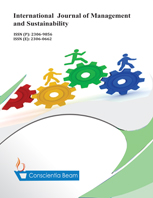Comparing ethical environments: Accountants in Indonesia
DOI:
https://doi.org/10.18488/11.v13i3.3829Abstract
This study aims to compare the ethical environment perceptions between accountants working in public companies and accountants working in private companies. The organization has experienced a decline in ethical values due to numerous accounting scandals and dysfunctional behavior. The institutional logic theory is used as a framework. The data was collected using questionnaires from 768 accountants working in public companies, private companies, and universities in Indonesia. The questions encompass three main factors, namely social norms, social practices, and outcomes. Hypothesis testing was conducted based on the mean values, standard deviations, and regression analysis. The correlation between variables was assessed using the Pearson product moment and spearman methods. The study results indicate that accountants working in public companies perceive the ethical environment to be stronger than accountants working in private companies. This study holds significant social and economic relevance. Assessing the ethical environment of both private and public companies aids stakeholders in developing governance policies that can reduce the potential for accounting scandals and enhance public trust. The study provides important insights into the ethical environment of accountants across the accounting profession. The study’s findings are perception-based and may not always reflect actual ethical practices. Several suggestions for future research are outlined in this paper.

